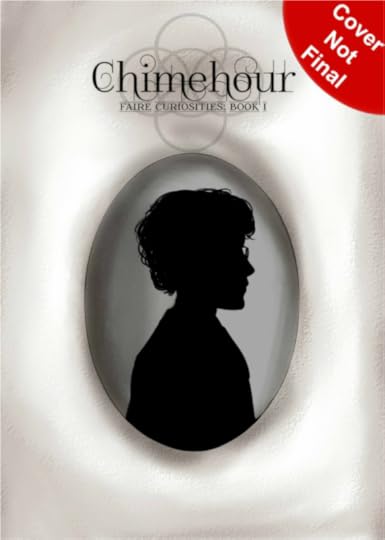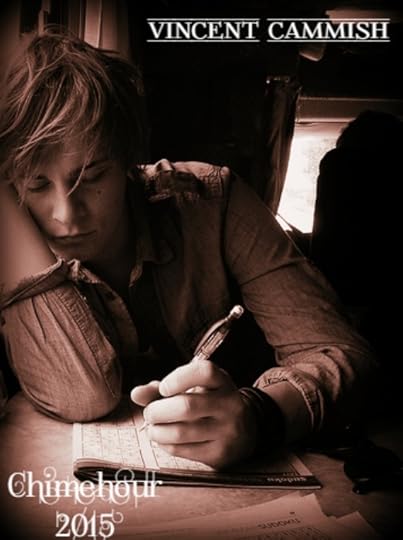Caitlin E. Jones's Blog, page 6
October 22, 2015
August 19, 2015
A writer and a keyboard: The growing pains of the internet base
 In terms of daily routine, the writerly life is not a colorful one. I spend most free afternoons mornings checking in on whatever emails and notifications I have. I fix a pot of tea and wake up my brain before promptly shutting off my Internet and settling in to write. There are breaks for reading, food, and more tea, but very little changes of this routine until the wee hours of the morning.
In terms of daily routine, the writerly life is not a colorful one. I spend most free afternoons mornings checking in on whatever emails and notifications I have. I fix a pot of tea and wake up my brain before promptly shutting off my Internet and settling in to write. There are breaks for reading, food, and more tea, but very little changes of this routine until the wee hours of the morning. I love my job, but I’m a social creature. Hours of writing are tedious, even to those who love writing. Which is why I love being connected to my readership; I love notes on here, or Pinterest, or Goodreads. I love when my readers let me know how much they enjoyed reading something, or how much they look forward to a book, or if they like a picture of my cats. These comments remind me that my hours are worth the effort to someone, even if it’s just one person. That connection is so, so special.
And I know I’m not alone in that feeling. Many writers take to social media and actively reach out to their audiences, creating a unique experience that only the Internet can offer: a direct connection. This is, in its own right, one of the best tools to hand the often reclusive writer and the often shy reader. The walls of pomp and business are broken down, leaving only people and conversation in its stead.
With this world into the interpersonal artist has its roadblocks. Social media is oftentimes as treacherous as it is kind, especially to the open-minded writer and the honest reader. Many popular authors such as John Green and Cassandra Clare formed a good dynamic with their bases, only to be forced to guard themselves when their books' audiences grew. Rumors fly. Hate-mail rolls in. Arguments proceed. And with most authors manning their own social media, the line between what not to react to can become difficult.
And of course, there are indie authors. Small-timers and self-published folks, like myself. Oftentimes, the indie author's image is their starting point. So many blogs encourage having an online presence far before you begin pushing a book. As an indie author, this will probably be your first and best step, because your online base counts for a lot. This will also be the worst step, because your readers now make and break you, depending not only on your writing, but on your behavior.
Over the summer, the whole of the writing world laughed when indie-published Dylan Saccario had a meltdown over a single negative reviewer. He came under fire on Goodreads; his ratings and reputation were tarnished in the aftermath. Searching “indie author meltdown” pulls him up fast, amongst a number of others who have committed “social-media suicide.” Fits thrown at reviewers. Fights with other authors. Flame wars that burn with the fuel of a thousand careers. Without a publishing house to fall onto, or an agent to pull people back, many of these authors vanish into the ether. After all, rep is everything and the Internet is forever.
The idea to finish this blog post, which I started in June, was admittedly spurred from my own recent experiences with the Internet. My small-sized writing community suffered a few incidents of author fit-throwing and bad behavior. Doing well in a recent contest, my intentions when critiquing were called into question. I watched as several well-known writer friends had the same (and worse) thrown their way over simple ranks in a competition.
I sighed and fought the urge to get too annoyed. Coming from a five-year stint in fan fiction and four years as an active, semi-popular YouTuber, I have weathered familiar storms.
An unfortunate effort to share my work with a particular editing event had one member so angry she started a rampage because I was a “subscription whore”. The fight grew nasty enough that the bully began spreading rumors about me to viewers through PM.
Several 4chan members found me through an anti-bullying campaign video, its removal ironically ending the harassment and threats I had received for a week.
A young member of my fan fiction group once faked his own death for attention.
A young AMV editor I exchanged emails with was reported dead in 2010, having killed herself over bullying on the site.
You just cannot win.
But you can press forward.
The Internet is concentrated troll, and you cannot fight that part. Witnessing what I have over the years though, I have also experienced a great deal of kindness and support from people who are basic strangers to my real life. Awkward and lacking in verbal communication, but still meaningful.
The author's relationship with their readership is just another example of this awkwardness. Our culture bashes on the famous and creative like they are not people; the Internet expects them to participate like they are. Neither know how to handle this responsibility. We continue break barriers, even though we are no longer sure how to act. As I recently read from Amanda Palmer, “some people just suck.” But that doesn't mean everyone does, nor do they have to.
I personally love my connection with my readers and fellow authors. I thrive better, knowing they are out there somewhere. To that end, I hope the growing culture around viewer/creator connections will foster a more positive environment. A little kindness, after all, goes a long way.
Published on August 19, 2015 15:18
July 13, 2015
July 12th, 2015
Chimehour is making some big steps on the road to its release on September 15th, 2015!
First off, you can now check out the trailer for the book, made by yours truly. ^^ It's a visual treat, and reminded me how much I love editing really. Give it a look, if you're curious.
The next part is the sample, which I have released this past month via Amazon, WattPad, Smashwords, Inkitt, and Goodreads! All those can be found on my Books page. ^^
First off, you can now check out the trailer for the book, made by yours truly. ^^ It's a visual treat, and reminded me how much I love editing really. Give it a look, if you're curious.
The next part is the sample, which I have released this past month via Amazon, WattPad, Smashwords, Inkitt, and Goodreads! All those can be found on my Books page. ^^

Published on July 13, 2015 00:13
May 4, 2015
Chimehour: Stanley and Vincent
Published on May 04, 2015 11:37
April 25, 2015
Chimehour: Cecilia and Willow
Published on April 25, 2015 10:37
February 19, 2015
The undergrad Novelist: 4 Tips for writing in college
 Writing a novel is tough. There, I've said the age old mantra. The fateful words that eventually leave anyone who is penning their first draft, or revising for the tenth time, or banging their head against the wall over query letters and synopsis work. It's a full time job without a whole lot of pay, and consumes your time like a hungry monster, eager for the next words you put down.
Writing a novel is tough. There, I've said the age old mantra. The fateful words that eventually leave anyone who is penning their first draft, or revising for the tenth time, or banging their head against the wall over query letters and synopsis work. It's a full time job without a whole lot of pay, and consumes your time like a hungry monster, eager for the next words you put down.College is, by comparison, also tough. Sometimes tougher then writing, depending on your opinion. The pressing hours, study binges, and social networking can be as dizzying as they are enjoyable. School has a tendency to become one's job, and that doesn't account for your time if you have an actual job to attend as well.
So, that all being said, it sounds outright impossible to do both, right?
And yet I have still gone for it.
A summer before I started my first semester, I decided to sit down and finish penning for first novel, Chimehour. Because it was time; because I would write, no matter what got in my path. Two years and two books later, I'm still going strong; always busy, and usually happy, but going strong.
Here's a few tips on how I did it, and how you can too!
Set a schedule (and keep it):
This should be rule #1 in writing anyway, but this applies heavily if you're in school. Honor your class schedule and homework time, working a space for writing between them, even if it's just on your breaks between class. One recent semester, my free time comprised of an hour break between History and Math; I managed 500-800 words per session (and that added up during my weekends and weeks off). You will be surprised at what you can pump out in the span of a few hours a day. Do try not to have writing timed in a way that interferes with sleep or social time (though, let's be fair; writing interferes with these sort of things anyway. Sometimes you can't avoid it) and keep to a schedule once you've set it. Your brain becomes accustomed to a time table so wonderfully well; use that to your advantage!
Harmonize studying and writing!
Time is a monstrous thing with school, and studying usually takes up most of it. Homework is perhaps the biggest obstacle between yourself and your writing work, and depending on your load, it often leaves you too drained to work on anything else. This is in part why I got into the habit of cycle the two around each other instead. On my free days, I have a “homework first” policy, meaning at least half of my assigned work must be done before I start writing at all. On lengthier projects (essays or studying for exams), I usually break my time apart, putting “writing rewards” at the end of study session. It works and leaves you feeling very productive! The key to this is not procrastinating though; putting off work to write only leaves you stressed and unable to work anyway. It's better use of your time if you just get homework done now, so you can enjoy your novel in peace.
Use your free time wisely.
I've had a few school-aged friends since I started writing, all excited about The Story Idea that they have conjured up recently. They have story boards they have on Pinterest, and a layout jotted over three notebooks, and all these stellar things they're gonna write. This conversation almost always then branches into a diatribe about how little time they have to write though. They have jobs; they have school, so they can't start this book, much less work every day. “It's so much to do,”- onward and so forth...
I'll tell you, this conversation confuses me to no end.
And forgive me; I freelance, so my free time is a little different. But you know that break you have during the summer? That weekend where you don't need to study? That aforementioned hour between classes? You could write there. You could write anywhere. Most novelists don't just sit around and wait for inspiration; they locate inspiration whilst working a job (or two), or taking care of kids, or yes- attending school. Your free time is your ally, and when you use it well, writing happens. Otherwise, Netflix and Facebook happens, and that's on you alone.
Ignore the doubts.
You can write around your classes. You can make time for your work. You can finish a novel.
And no matter your age, or gender, or what you're in school for, write what you want. Creative writing classes won't make you a writer anymore than math classes could make me a math teacher. Majoring in English will usually make no difference on whether or not you can jot down 100k novel. If that's your passion in school, go for it, but if not, write anyway.
--
Are you a college student and writing? What are your experiences? What have you done you to keep up your work?
Published on February 19, 2015 11:07
April 26, 2014
The Hard Lessons of A Former Fan Fiction Writer
As a busy writer in the midst of finishing the second draft on a novel, I have come to a crossroads; that strange point between claiming “I have a great concept” and calling myself an author. After a year and a half dedicated to this book, I have obviously reached a very different place than Concept World. And as a result of this, I have evolved with my book. Grown from it, and I continue to do so every day.
But everyone starts somewhere, right? And that’s what I’m intent to talk about today. Because no one begins with a fully drafted book, or even a fully fledged concept on how writing works. Everything, from the time we are young, is a learning process. That was true of me, who spent a large slice of her childhood making picture book adventures of my family chickens, and creating vast governments for my toys (judge not: I was a weird child). I loved to create, but I needed to start somewhere…
I suppose that was how TwilaStarla came to be. And furthermore, how I came to write Kim Possible fan fiction.
Fan fiction: just writing the word makes me a little nervous now. Writing fan fiction comes with negative connotations these days, due to some authors and how they have used it. Fandoms and actual authors are worlds away from each other, yes? And there always seems to be a reason for that. Writers who spend too much time in a fandom often come out bewildered and full of poor novels.
But this isn’t always true. Even greats like Neil Gaiman (a personal favorite author of mine) wrote fan fics at one point, and claim that it is a productive, healthy part of becoming an author.
And there are things to be learned of writing fan fiction, from my personal experience.
At the awkward, girlish age of eleven, I had two loves: creative satire and superheroes (once more, judge not: I was a weird child). So, when Kim Possible first came out, I was instantly hooked. Hooked more than usual, actually, and enough to stay hooked on the show for another five years. This was helped in part when I discovered its growing fandom around 2004. And its sizable collection of fan fiction with it. One thing led to another, and the next thing I knew, I was working my own first fan fictions.
And before you ask: no, I did not write lemon (or smut, depending on your terms), or read them for that matter. As fangirls went, I was something of an odd puritan about those things. This resulted in me becoming an OC creator and an AU writer. I liked taking the worlds I wrote about and twisting them ever so slightly. This is well exampled in my first story, a tale of heroism detailing the lives of every main cast members’ newly imagined younger siblings and children. It was a nineteen chapter saga, written in a black notebook and glitter gel pen.
Oh, it was very likely awful. But, see, I had written my first story. That’s what mattered.
A couple years passed, and I kept writing new stories until I turned thirteen. A big story in particular, detailing the adventures of my treasured OC, Mira, and her misunderstood life. Her extra special powers. Her super awesome parents… *sigh* Granted, she had black hair (not blonde, as I have)… expect I wanted black hair. *double sigh*
Mary-Sues are a writer’s bane now, but I have a different thought about this. Because- see, she wasn’t a Mary-Sue to me then. She was an expression of something; an escape. And by all means, that made me happy.
When working out your first writing, express the Mary-Sue. Let it happen. Because it’s going to happen: the first stories we write are autobiographical, they say. So, loose yourself of her in fan fiction, and make it what you want. Because once you’ve learned how to write those excesses, you can figure out how to take them out in the future.
My next lesson came when I got myself an account on FanFiction.net. I took all of those stories and posted them to an unknown populace, and would continue to do this for another three to four years. In those years, I developed my writing habits. My ticks and tricks that got my through several novel-length fics. Some of these were truly beneficial, but others… not so much.
One of the first things I realized about posting fan fiction is that your audience does not come to you. For all the friends I had, garnering readership meant being active and catching people’s attention on that front page. Pushing your work everywhere; promoting everything. This meant pumping chapters out fast, one by one, and without much editing. (Note: I am aware not every fan fiction author does their stories this way, but this is a norm amongst FF.net and Wattpad writers).
This meant giving chapters quick revising, but little else.And this constant stream of writing did not teach me a lick of editing skills. And at then fourteen, I actually give myself leeway. There was a raw, simple rush of writing a first draft and sharing it with the world that kept my confidence bright and my writing fast. But I was forced break this upon working on full novels. Some authors don’t, but I do warn you; a full-fledged, purely yours, piece of fiction will take more than a read-through to clean up and tighten. Make it a habit early on, and use it often. It can save most any story, I think, and will save you a few tears when you post your work.
In terms of fan fiction, I was a success in my own right. I won awards for my work. I got chapters featured on websites. I made some of the best friends I have ever made on the Internet. All before retiring from the Kim Possible fandom in 2009. And retiring from fan fiction work with it.
Now, the resulting fan fictions (and other work) I wrote, well… they are here, for the most part:
https://www.fanfiction.net/u/914364/Twila-Starla
https://www.fictionpress.com/u/643797/Twila-Starla
By all means, read through them. Laugh at them. Enjoy them. They are basic time machines to myself at sixteen years old- and horrible though that is, there is something to be learned from sixteen-year-old me. Something to be said of progress, no matter how small it may seem.
So, say what we might about the Fifty Shades of Greys and Mortal Instruments of this world, there is merit in starting on fan fiction, no matter how old or young you are.
There is merit in letting go of fan fiction and writing your own story, for better or worse.
There is merit in writing nothing but fan fiction, if that’s what makes you happy.
That is the biggest point. Write what makes you happy, and learn every step of the way.
But everyone starts somewhere, right? And that’s what I’m intent to talk about today. Because no one begins with a fully drafted book, or even a fully fledged concept on how writing works. Everything, from the time we are young, is a learning process. That was true of me, who spent a large slice of her childhood making picture book adventures of my family chickens, and creating vast governments for my toys (judge not: I was a weird child). I loved to create, but I needed to start somewhere…
I suppose that was how TwilaStarla came to be. And furthermore, how I came to write Kim Possible fan fiction.
Fan fiction: just writing the word makes me a little nervous now. Writing fan fiction comes with negative connotations these days, due to some authors and how they have used it. Fandoms and actual authors are worlds away from each other, yes? And there always seems to be a reason for that. Writers who spend too much time in a fandom often come out bewildered and full of poor novels.
But this isn’t always true. Even greats like Neil Gaiman (a personal favorite author of mine) wrote fan fics at one point, and claim that it is a productive, healthy part of becoming an author.
And there are things to be learned of writing fan fiction, from my personal experience.
At the awkward, girlish age of eleven, I had two loves: creative satire and superheroes (once more, judge not: I was a weird child). So, when Kim Possible first came out, I was instantly hooked. Hooked more than usual, actually, and enough to stay hooked on the show for another five years. This was helped in part when I discovered its growing fandom around 2004. And its sizable collection of fan fiction with it. One thing led to another, and the next thing I knew, I was working my own first fan fictions.
And before you ask: no, I did not write lemon (or smut, depending on your terms), or read them for that matter. As fangirls went, I was something of an odd puritan about those things. This resulted in me becoming an OC creator and an AU writer. I liked taking the worlds I wrote about and twisting them ever so slightly. This is well exampled in my first story, a tale of heroism detailing the lives of every main cast members’ newly imagined younger siblings and children. It was a nineteen chapter saga, written in a black notebook and glitter gel pen.
Oh, it was very likely awful. But, see, I had written my first story. That’s what mattered.
A couple years passed, and I kept writing new stories until I turned thirteen. A big story in particular, detailing the adventures of my treasured OC, Mira, and her misunderstood life. Her extra special powers. Her super awesome parents… *sigh* Granted, she had black hair (not blonde, as I have)… expect I wanted black hair. *double sigh*
Mary-Sues are a writer’s bane now, but I have a different thought about this. Because- see, she wasn’t a Mary-Sue to me then. She was an expression of something; an escape. And by all means, that made me happy.
When working out your first writing, express the Mary-Sue. Let it happen. Because it’s going to happen: the first stories we write are autobiographical, they say. So, loose yourself of her in fan fiction, and make it what you want. Because once you’ve learned how to write those excesses, you can figure out how to take them out in the future.
My next lesson came when I got myself an account on FanFiction.net. I took all of those stories and posted them to an unknown populace, and would continue to do this for another three to four years. In those years, I developed my writing habits. My ticks and tricks that got my through several novel-length fics. Some of these were truly beneficial, but others… not so much.
One of the first things I realized about posting fan fiction is that your audience does not come to you. For all the friends I had, garnering readership meant being active and catching people’s attention on that front page. Pushing your work everywhere; promoting everything. This meant pumping chapters out fast, one by one, and without much editing. (Note: I am aware not every fan fiction author does their stories this way, but this is a norm amongst FF.net and Wattpad writers).
This meant giving chapters quick revising, but little else.And this constant stream of writing did not teach me a lick of editing skills. And at then fourteen, I actually give myself leeway. There was a raw, simple rush of writing a first draft and sharing it with the world that kept my confidence bright and my writing fast. But I was forced break this upon working on full novels. Some authors don’t, but I do warn you; a full-fledged, purely yours, piece of fiction will take more than a read-through to clean up and tighten. Make it a habit early on, and use it often. It can save most any story, I think, and will save you a few tears when you post your work.
In terms of fan fiction, I was a success in my own right. I won awards for my work. I got chapters featured on websites. I made some of the best friends I have ever made on the Internet. All before retiring from the Kim Possible fandom in 2009. And retiring from fan fiction work with it.
Now, the resulting fan fictions (and other work) I wrote, well… they are here, for the most part:
https://www.fanfiction.net/u/914364/Twila-Starla
https://www.fictionpress.com/u/643797/Twila-Starla
By all means, read through them. Laugh at them. Enjoy them. They are basic time machines to myself at sixteen years old- and horrible though that is, there is something to be learned from sixteen-year-old me. Something to be said of progress, no matter how small it may seem.
So, say what we might about the Fifty Shades of Greys and Mortal Instruments of this world, there is merit in starting on fan fiction, no matter how old or young you are.
There is merit in letting go of fan fiction and writing your own story, for better or worse.
There is merit in writing nothing but fan fiction, if that’s what makes you happy.
That is the biggest point. Write what makes you happy, and learn every step of the way.
Published on April 26, 2014 09:05




 Click on the pictures above to learn more about the characters,
Click on the pictures above to learn more about the characters, 

